Related Research Articles
This article contains information about the literary events and publications of 1985.
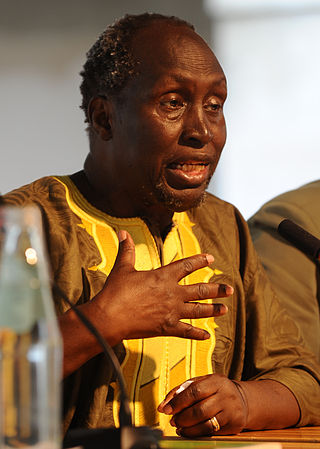
Ngũgĩ wa Thiong'o is a Kenyan author and academic who writes primarily in Gikuyu and who formerly wrote in English. He has been described as having been "considered East Africa’s leading novelist". His work includes novels, plays, short stories, and essays, ranging from literary and social criticism to children's literature. He is the founder and editor of the Gikuyu-language journal Mũtĩiri. His short story The Upright Revolution: Or Why Humans Walk Upright, is translated into 100 languages from around the world.

Ismail Kadare is an Albanian novelist, poet, essayist, screenwriter, and playwright. He is a leading international literary figure and intellectual. He focused on poetry until the publication of his first novel, The General of the Dead Army, which made him famous internationally.

Chinua Achebe was a Nigerian novelist, poet, and critic who is regarded as the dominant figure of modern African literature. His first novel and magnum opus, Things Fall Apart (1958), occupies a pivotal place in African literature and remains the most widely studied, translated, and read African novel. Along with Things Fall Apart, his No Longer at Ease (1960) and Arrow of God (1964) complete the so-called "African Trilogy"; later novels include A Man of the People (1966) and Anthills of the Savannah (1987). He is often referred to as the "father of African literature", although he vigorously rejected the characterization.
Alex La Guma was a South African novelist, leader of the South African Coloured People's Organisation (SACPO) and a defendant in the Treason Trial, whose works helped characterise the movement against the apartheid era in South Africa. La Guma's vivid style, distinctive dialogue, and realistic, sympathetic portrayal of oppressed groups have made him one of the most notable South African writers of the 20th century. La Guma was awarded the 1969 Lotus Prize for Literature.
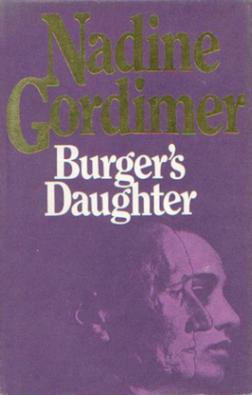
Burger's Daughter is a political and historical novel by the South African Nobel Prize in Literature-winner Nadine Gordimer, first published in the United Kingdom in June 1979 by Jonathan Cape. The book was expected to be banned in South Africa, and a month after publication in London the import and sale of the book in South Africa was prohibited by the Publications Control Board. Three months later, the Publications Appeal Board overturned the banning and the restrictions were lifted.

South African literature is the literature of South Africa, which has 11 national languages: Afrikaans, English, Zulu, Xhosa, Sotho, Pedi, Tswana, Venda, Swazi, Tsonga and Ndebele.
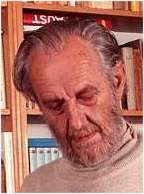
Peter Rudolf Gisela Horn was a Czech-born South African poet. He made his mark especially with his anti-Apartheid poetry. At the end of World War II he had to flee from his home and settled with his parents first in Bavaria and later in Freiburg im Breisgau, where he completed high school in 1954. He then emigrated with his parents to South Africa.
Richard Moore Rive was a South African writer and academic, who was from Cape Town.
Askia Muhammad Touré is an African-American poet, essayist, political editor, and leading voice of the Black Arts Movement. Toure helped to define a new generation of black consciousness by creating a triumphal identity for the purpose of uplifting the African heritage beyond the oppressive ideas that dominated the time.

Aminatta Forna, OBE, is a Scottish and Sierra Leonean writer. She is the author of a memoir, The Devil That Danced on the Water: A Daughter's Quest, and four novels: Ancestor Stones (2006), The Memory of Love (2010), The Hired Man (2013) and Happiness (2018). Her novel The Memory of Love was awarded the Commonwealth Writers' Prize for "Best Book" in 2011, and was also shortlisted for the Orange Prize for Fiction. Forna is Professor of Creative Writing at Bath Spa University and was, until recently, Sterling Brown Distinguished Visiting professor at Williams College in Massachusetts. She is currently Director and Lannan Foundation Chair of Poetics of the Lannan Center for Poetics and Social Practice at Georgetown University.
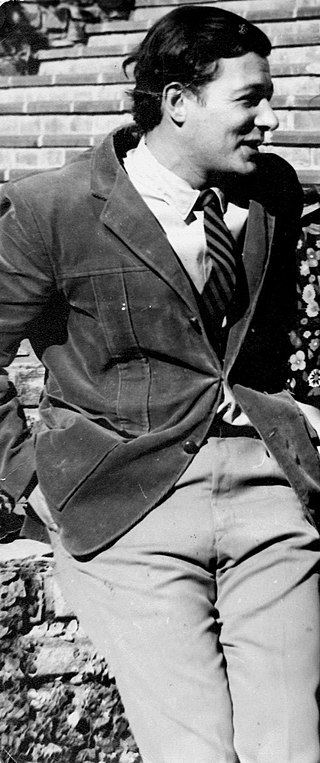
Alfred John WannenburghIII was a South African author, journalist, conservationist, and anti-apartheid activist from Cape Town. His early political writings which began in 1961/62 cemented his career as a left-wing protest writer in the radical pan-African literary scene and led him, Richard Rive, and Jan Hoogendyk to form what Grant Farred called the "Western Cape Protest School" constituted by Wannenburgh, Rive, Alex La Guma, and James Matthews—who occasionally met at Hoogendyk's Rondebosch home. Wannenburgh attended both Rondebosch Boys' Preparatory School and Rondebosch Boys' High School and received his undergraduate degree in Cultural Anthropology, African History, and Political Philosophy from the University of Cape Town (UCT). His career in journalism began in 1961 and ended in 2010. He worked for many years as a foreign correspondent or stringer for America's Associated Press and Britain's The Guardian. Domestically, he was also a columnist, feature writer, and sub-editor for the Cape Times, Weekend Argus, and Sunday Times in particular, from 1984 to 2010, while taking several research sabbaticals in-between.
The Lotus Prize for Literature is a literary award presented annually to African and Asian authors by the Afro-Asian Writers' Association. It was established in 1969 but cancelled in 1988. During this period, the Soviet Union was the sponsor of the prize. After this lengthy hiatus, in November 2019, it was reinstated following the renaming of the institution as the Writers' Union of Africa, Asia, and Latin American (WUAALA).
George Hallett was a South African photographer known for images of South African exiles. His body of work captures much of the country's turbulent history through Apartheid and into the young democracy.

Trafalgar High School is a public English medium co-educational secondary school in District Six of Cape Town in South Africa. It was the first school built in Cape Town for coloured and black students. The school took a leading role in protesting against apartheid policies. It celebrated its centenary in 2012 and is still running.
And a Threefold Cord is a 1964 novel by South African novelist Alex la Guma. The novel is La Guma's second, and is not heavily reviewed by critics. The novel is set in the Cape Flats, an impoverished area near Cape Town.
In the Fog of the Seasons' End is a 1972 novel by South African novelist Alex La Guma. Like many of La Guma's other novels, it is focused on challenging the social systems of apartheid in South Africa. The main character in the novel, Beukes, is an organizer of an anti-apartheid underground. The novel was dedicated to Basil February and other resistance fighters who died in Zimbabwe in 1967. The novel has been extensively explored as part of marxist literary criticism, while reflecting on La Guma's marxist political philosophy.

A Soviet Journey is a 1978 travelogue by South African socialist Alex La Guma. Writing in the early 90s, critic Roger Field described the book as one of the under examined works from La Guma's corpus, because of his reputation as a fiction writer first, and the political nature of Western academics commenting on a book title "Soviet" during the Cold War.
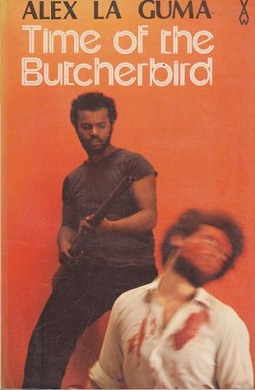
Time of the Butcherbird is the final novel by South African novelist Alex La Guma. The novel was first published in 1979.
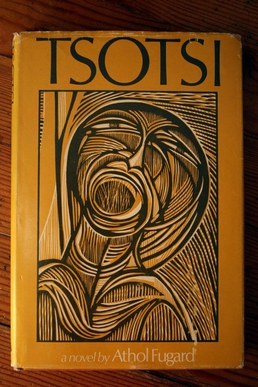
Tsotsi is the only novel written by South African playwright Athol Fugard. It was published in 1980 although written some time earlier, and it was the basis of the 2005 film of the same name. It has been republished in several editions including in 2019 by Canongate (ISBN 978-1786896155).
References
- ↑ Kathleen M. Balutansky (1990). "The Stone Country: Images of Imprisonment or Imprisonment of Images?". The Novels of Alex La Guma: The Representation of a Political Conflict. Lynne Rienner Publishers. pp. 57–80. ISBN 978-0-89410-558-6.
- ↑ "La Guma gave a voice to the voiceless". IOL. Retrieved 12 May 2016.
- 1 2 Gareth Cornwell; Dirk Klopper; Craig Mackenzie (19 June 2012). "Alex La Guma". The Columbia Guide to South African Literature in English Since 1945. Columbia University Press. pp. 120–122. ISBN 978-0-231-50381-5.